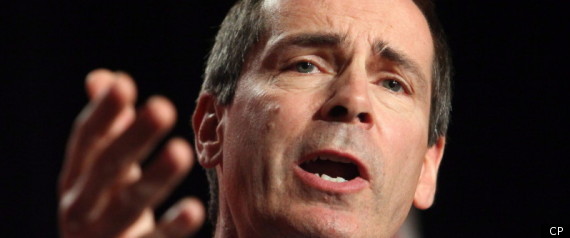 TORONTO - Ontario Premier Dalton McGuinty tried Wednesday to turn down the heat generated by his comments earlier in the week about preferring a lower dollar to a growing oil and gas sector in Western Canada.
TORONTO - Ontario Premier Dalton McGuinty tried Wednesday to turn down the heat generated by his comments earlier in the week about preferring a lower dollar to a growing oil and gas sector in Western Canada.McGuinty admitted he was "a bit surprised" by the extent of the blowback from his comments Monday, when he said Canada's high "petro-dollar" was bad for Ontario manufacturers and exporters.
"I think I should clarify ... we are very, very proud of the work that is being done by Canadians in every province and territory to strengthen our country," McGuinty told reporters.
"We have a strong sense of partnership with Canadians from coast to coast to coast."
The mea culpa wasn't enough for Alberta Premier Alison Redford. Her position is that the entire Canadian economy, and Ontario in particular, benefits from the oilsands.
She told an open-line radio show that she felt her province was owed an apology from the Ontario premier.
She suggested McGuinty's original comments were born out of the difficult financial situation his government is in.
"There's really tough circumstances there. Because in Ontario there has been an awful lot of spending, there's a lot a debt, the deficit is projected to be high, and they are going to have to come to terms with some of that," Redford told host Dave Rutherford.
"What we are saying is we give you an opportunity to grow an economy to deal with some of that."
Redford, a Progressive Conservative whose party will head to the polls in the coming weeks, has had an ally in this spat in the form of Saskatchewan's Premier Brad Wall. Wall said Tuesday that the Ontario premier was being "unnecessarily divisive."
Editorial writers across the country also took McGuinty to task for being "ungracious" in his response to Redford's request that Ontario and Quebec speak up for the oilsands.
Although he never apologized for Monday's comments, there was a hint McGuinty regretted having said that given a choice between a lower dollar or a growing oil and gas sector in the West, he'd take the lower dollar.
"It can be difficult in this kind of context to convey exactly what you want to say," said McGuinty.
"I work in real time. So sometimes I may not self-edit before I go to press, so to speak, unlike the luxury you good people enjoy."
Redford noted that business leaders in Ontario understand the oilsands and what they mean to the Canadian economy.
"Certainly the feedback we got recently, since his comments ... is: that might be the perspective he had on Monday, but in terms of corporate leadership and industry leadership in Ontario, they understand the importance of the oilsands and Alberta's resources," she said.
The Loonie hit a 5 1/2-month high Wednesday, reaching 101.31 cents US.
McGuinty noted he was one of 10 children growing up, comparing his family to Canada's 10 provinces, and said each has its individual strength.
"I want to assure Canadians living in other parts of the country that we’re going to continue to do our part here in Ontario as committed Canadians to strengthen our national economy."
Ontario complains that the federal government helps subsidize Alberta's oilsands and energy projects in other provinces, such as Newfoundland and Labrador, but offers nothing to help Ontario shut down coal-fired generation and switch to more wind and solar power.
McGuinty said he and Redford have talked about ways of including Ontario in the federal energy strategy.
"I think where we can make common cause is if we talk about a national energy strategy," he said.
"I’d like that to officially include a clean energy strategy and the work that we’re doing here in Ontario. I’d like to broaden the vision so it’s one that we can all share, right across the country."
McGuinty wouldn't say if he's asking Alberta to publicly support Ontario's push to manufacture industrial wind turbines and solar panels as part of its switch to a new, green-energy economy.
The Canadian Energy Research Institute says Ontario enjoys the lion's share of oilsands benefits outside Alberta. The Calgary-based think-tank predicts the oilsands will create $63 billion in economic spinoffs and 65,000 jobs in Ontario over 25 years, along with smaller economic benefits for British Columbia and Quebec.
Original Article
Source: Huff
Author: Canadian Press
No comments:
Post a Comment